Whether we like it or not, we humans are justification machines. We can justify anything, for example, why we drive the car we do, why we stopped the exercise, why our relationships ended. Just spend a moment in court, and you will notice the justification machine in progress. At the extremes, watch our leaders in international war discussions on television. In so many cases, we take the action and then try to explain it after.
On the world climate stage, you can see it happen in real-time with our leaders promising fidelity to the global climate cause, but once they get back home, the cheating starts. The UN report just published shows how the ‘governments, in aggregate, still plan to produce more than double the amount of fossil fuels in 2030 than would be consistent with limiting warming to 1.5°C.’ The most concerning fact is that they plan to increase production.

Global fossil fuel production gap - Source: Production Gap Report
The report states that ‘taken together, government plans and projections would lead to an increase in global coal production until 2030, and in global oil and gas production until at least 2050’. The report indicates that fossil fuel-producing nations' production plans would be 460% higher for coal, 29% for oil and 82% for gas than the 1.5 °C Paris Agreement.
‘Major producer countries have pledged to achieve net-zero emissions and launched initiatives to reduce emissions from fossil fuel production, but none have committed to reduce coal, oil, and gas production in line with limiting warming to 1.5°C.’
According to The Guardian, India leads in carbon emissions from planned coal production. At the same time, Saudi Arabia tops the list in oil emissions, and Russia contributes significantly through coal, oil, and gas. Additionally, the United States, Canada, and the United Arab Emirates have ambitious plans to become major players in oil production.

Government Emission Commitments and Production Targets - Source: Production Gap Report
The Guardian further reports that numerous scientific studies have determined that establishing new oil and gas fields contradicts the goal of maintaining global heating below the 1.5C limit set in the Paris Agreement. This includes a 2021 analysis by the International Energy Agency. In 2022, The Guardian exposed the intentions of the world's largest fossil fuel companies, unveiling plans for numerous "carbon bomb" oil and gas projects.
Reportedly, just five rich nations, the US, Canada, Australia, Norway and the UK, are responsible for 51% of planned new oil and gas extraction by 2050. Our leaders are committing resources and planning to deliver more emissions into our air when they should be focused on renewables.
The world will again get together for Cop28, the UN climate summit, on the 30th of November. What do you think will be achieved? Evidence suggests further commitments to emissions reductions will be proposed without phase-outs or reductions in fossil fuel production. Our ideals are solid, but then we wake up living in a capitalist consumer/voter-driven society.
We prefer to confess our sins and say sorry to our grandchildren and future generations than face the reality that we must take some pain in the short term. One thing is certain, our future leaders and we will have the perfect scientifically supported justifications the morning after.


